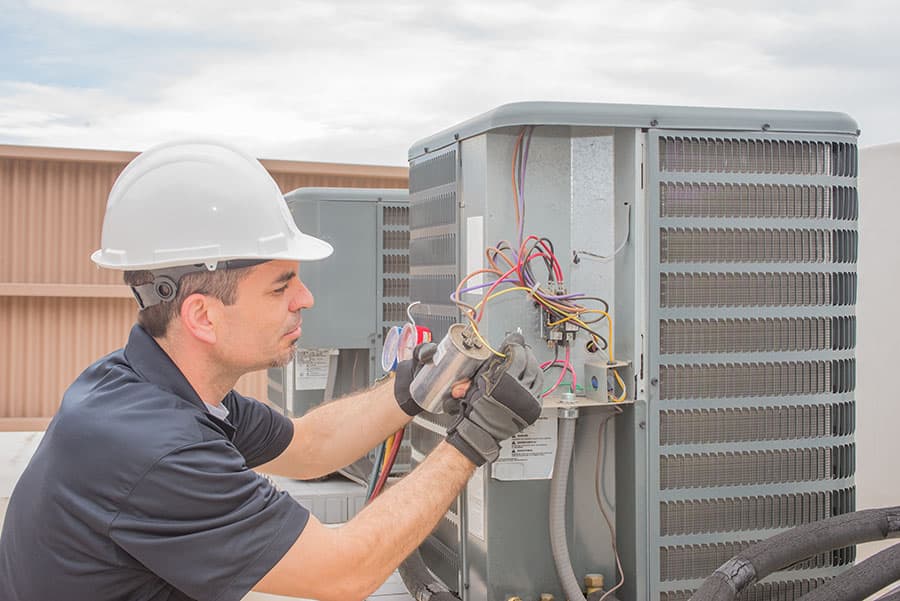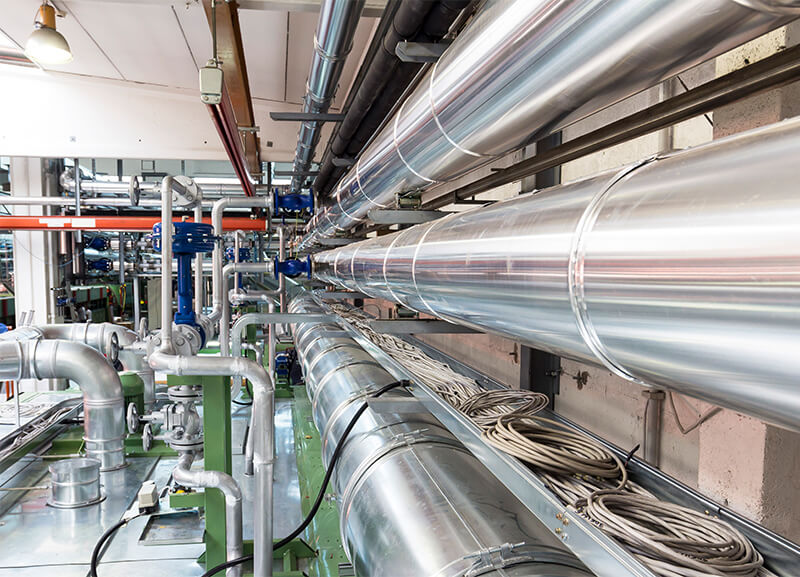Find out how HVAC experts recommend latest HVAC solutions
Wiki Article
Discovering the Necessary Components of an Efficient Heating And Cooling System
A reliable HVAC system is developed on numerous essential components that operate in consistency. Each component, from the thermostat to the ductwork, plays a vital duty in maintaining convenience and energy efficiency. Recognizing these elements is crucial for enhancing performance and enhancing indoor air top quality. As one checks out these components, the complex connections in between them reveal insights right into improving total system efficiency. What details factors add most to this performance?The Role of the Thermostat in Heating And Cooling Performance

Typically neglected, the thermostat plays a vital duty in the effectiveness of A/c systems. This little gadget serves as the main control center, controling temperature setups and making certain perfect comfort within a room. By properly picking up the ambient temperature level, the thermostat communicates with the air, heating, and ventilation conditioning units to preserve the desired environment
An efficient thermostat reduces power intake by turning on the heating and cooling system just when essential, therefore protecting against too much home heating or cooling. Modern programmable and wise thermostats enhance this effectiveness further by permitting users to establish timetables and from another location readjust setups, adapting to day-to-day regimens.
Furthermore, the positioning of the thermostat is vital; inappropriate place can bring about imprecise temperature analyses, causing ineffective operation. Generally, a well-functioning thermostat not just improves convenience but also adds considerably to power savings and the long life of the a/c system.
Recognizing the Relevance of Air Filters
Air filters offer an important feature in a/c systems by guaranteeing that the air flowing within a space stays tidy and healthy. These filters trap dust, allergens, and other toxins, stopping them from being recirculated throughout the setting. By catching these fragments, air filters add to improved interior air top quality, which can substantially benefit residents' health and wellness, particularly those with allergies or breathing conditions.Additionally, keeping tidy air filters improves the effectiveness of cooling and heating systems. Clogged up filters can limit air movement, causing the system to function tougher to preserve preferred temperature levels, leading to increased power usage and greater energy expenses. Regularly changing or cleaning up filters is an essential maintenance step that can extend the life-span of cooling and heating equipment. Eventually, understanding the importance of air filters permits home owners and structure managers to take positive steps to assure a well-functioning, effective heating and cooling system that promotes a comfortable and safe interior setting.

The Capability of the Furnace and Heat Pump
Heating systems and heat pumps are crucial parts of cooling and heating systems, accountable for supplying heat throughout colder months. Heaters run by heating air via combustion or electrical resistance, then dispersing it throughout the home using ducts. They normally provide rapid heating and can be sustained by gas, electricity, or oil, depending upon the system type.Alternatively, heatpump transfer warm rather than generate it. They extract warm from the outside air or ground, even in low temperature levels, and move it inside. HVAC experts. This twin functionality enables heat pumps to likewise provide cooling in warmer months, making them versatile options for year-round climate control
Both systems need proper maintenance to guarantee effectiveness and durability. While furnaces master severe cold, heatpump can be beneficial in moderate climates. Understanding their distinctive capabilities help homeowners in choosing one of the most ideal option for their heating needs.
Checking Out the A/c Unit
The a/c system is an important part of HVAC systems, available in various kinds to match different requirements. Recognizing the performance scores of these units is crucial for making notified selections concerning energy check out here usage and price. This section will discover the varied types of a/c and clear up how efficiency scores influence efficiency.Kinds of Air Conditioners
While various aspects influence the choice of cooling systems, understanding the different kinds offered is important for house owners and building supervisors alike. Central air conditioners are developed to cool entire homes or buildings, utilizing a network of ducts for air movement. Window devices provide a more localized remedy, suitable for single rooms or small rooms. Portable a/c provide adaptability, permitting users to move the unit as needed. Ductless mini-split systems are another option, combining the efficiency of main systems with the comfort of zoning, as they call for no ductwork. Finally, geothermal systems harness the earth's temperature level for energy-efficient cooling. Each kind comes with unique benefits, making notified selections vital for efficient environment control.
Effectiveness Ratings Described
Recognizing effectiveness rankings is necessary for picking the right a/c device, as these metrics give insight into the system's efficiency and energy intake. One of the most typical ranking for air conditioning system is the Seasonal Power Efficiency Proportion (SEER), which determines the cooling outcome during a regular air conditioning period separated by the total electric power input. A greater SEER indicates far better efficiency. In addition, the Power Effectiveness Proportion (EER) is made use of for determining performance under certain problems. Another essential metric is the Energy Celebrity certification, which represents that an unit satisfies stringent power performance standards. By evaluating these rankings, customers can make informed selections that not just maximize comfort however likewise minimize power costs and environmental impact.The Significance of Ductwork and Air flow
Effective ductwork design and air movement management play important duties in the total performance and performance of cooling and heating systems. Proper ductwork warranties that conditioned air is dispersed equally throughout a space, minimizing temperature level fluctuations and enhancing comfort. Well-designed ducts reduce resistance to air movement, minimizing the workload on heating and cooling tools and eventually decreasing power intake.Airflow monitoring entails purposefully positioning vents and registers to enhance the flow of air. This avoids typical concerns such as cool or hot areas, which can take place when airflow is obstructed or inadequately balanced. Additionally, the ideal air duct products and insulation can further improve performance by lowering warm loss or gain throughout air transit.
A reliable ductwork system not only contributes to energy financial savings but can additionally prolong the life expectancy of heating and cooling devices by decreasing unnecessary pressure (HVAC experts). Consequently, comprehending the relevance of ductwork and air movement is important for attaining peak a/c system performance
Normal Upkeep Practices to Boost Efficiency
Normal maintenance practices are vital for making certain peak efficiency of a/c systems. These methods consist of regular inspections, cleansing, and required repairs to maintain the system running successfully. Consistently altering air filters is crucial, as clogged filters can obstruct airflow find and reduce effectiveness. Additionally, service technicians ought to check and tidy evaporator and condenser coils to prevent getting too hot and power wastefulness.Annual expert inspections are additionally suggested, as trained specialists can recognize possible concerns before they escalate. Oiling relocating components reduces deterioration, adding to a longer lifespan for the system. Furthermore, guaranteeing that the thermostat operates appropriately help in keeping optimal temperature level control.

Often Asked Concerns
Exactly how Commonly Should I Replace My Thermostat?
Thermostats must usually be replaced every 5 to ten years, depending upon usage and technology developments. Regular checks are a good idea to assure peak efficiency, specifically if experiencing irregular temperature level control or enhanced energy expenses.What Size Air Filter Is Best for My A/c System?
The ideal dimension air filter for a heating and cooling system differs by device layout. Commonly, it's crucial to seek advice from the owner's manual or inspect the existing filter measurements to assure peak efficiency and air top quality.Can I Set Up a Warmth Pump Myself?
Installing a warm pump independently is possible for experienced people, but it needs understanding of electrical systems and neighborhood codes. Employing an expert is suggested to ensure appropriate installment and suitable system performance.Exactly how Do I Know if My Ductwork Is Effective?
To identify ductwork performance, one need to examine for leakages, step air flow at vents, check insulation top quality, and review temperature level differences between supply and return ducts. Expert analyses can supply complete insights into total efficiency.What Are Indicators My Heating And Cooling Needs Immediate Maintenance?
Signs that a cooling and heating system needs immediate maintenance consist of uncommon sounds, irregular temperatures, enhanced power expenses, unpleasant odors, and frequent cycling. Resolving these concerns quickly can protect against additional damage and guarantee optimal system efficiency.Air filters serve an essential function in Cooling and heating systems by try these out ensuring that the air circulating within a room stays tidy and healthy and balanced. Furthermore, maintaining clean air filters boosts the efficiency of HVAC systems. Ductless mini-split systems are one more alternative, integrating the performance of central systems with the benefit of zoning, as they require no ductwork. Recognizing efficiency rankings is important for picking the ideal air conditioning system, as these metrics supply understanding into the system's performance and energy consumption. The best size air filter for an A/c system varies by unit layout.
Report this wiki page